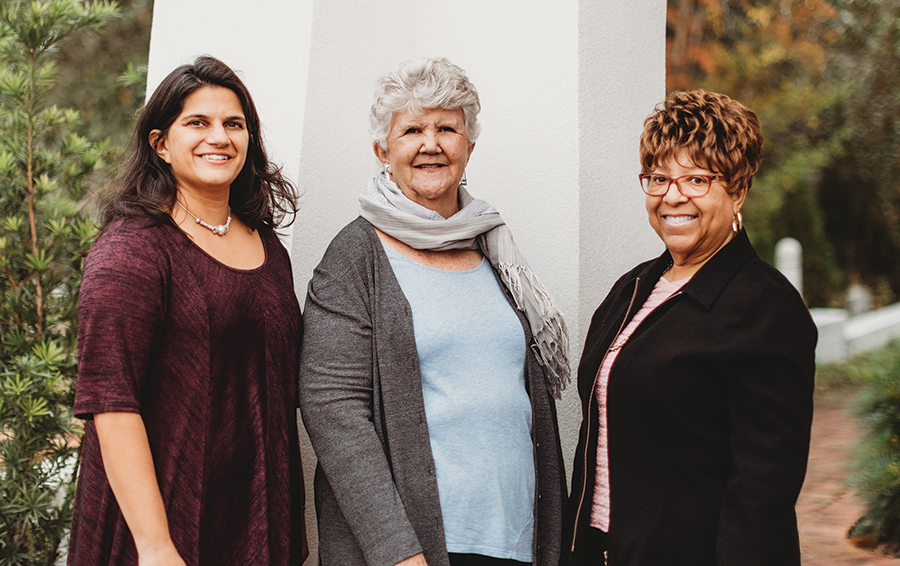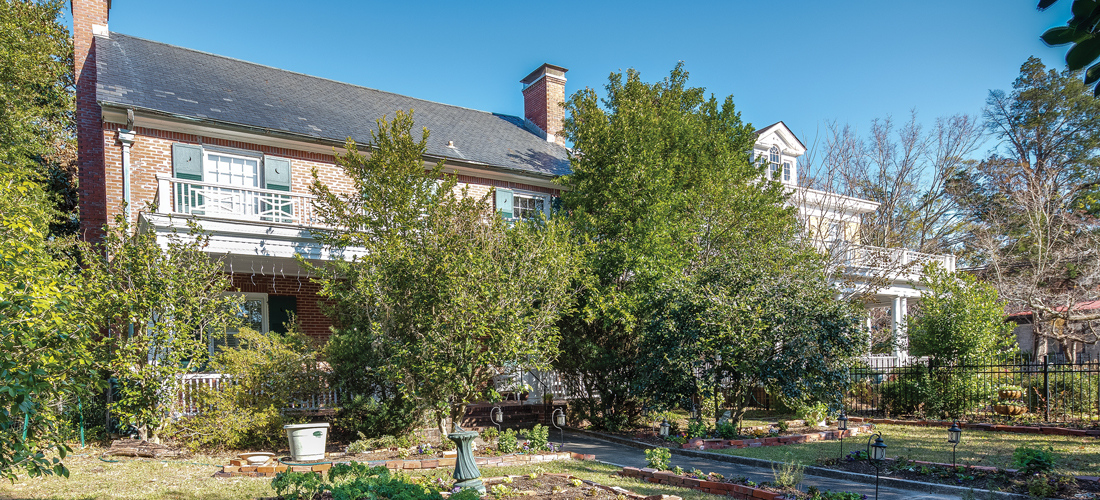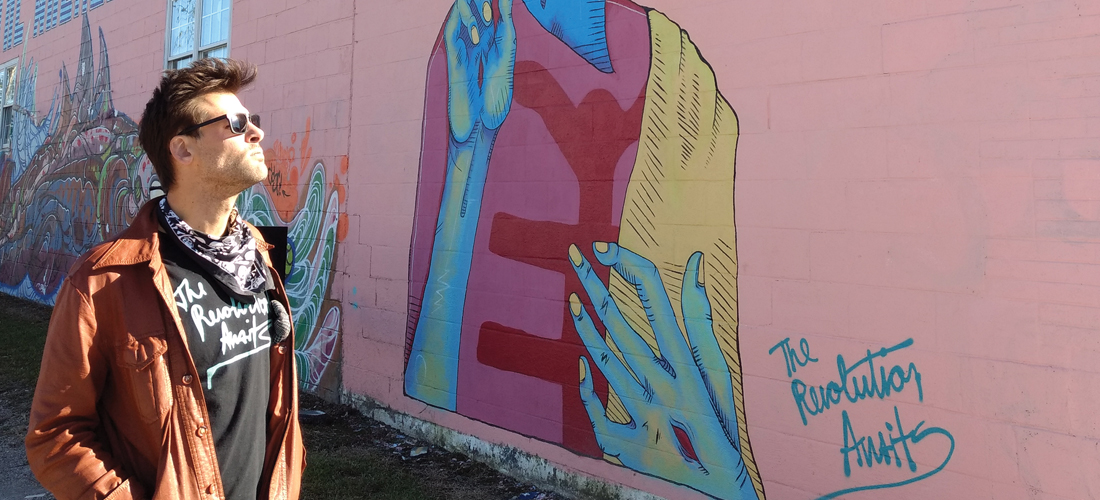A Winning Collective
Largely by word of mouth, a remarkable group of philanthropy-minded women are making things happen one smart grant at a time
By Virginia Holman
Photographs by Mallory Cash
Philanthropy. It’s one of those words that you often see alongside words like symphony, museum, gala, benefactor or billionaire. Not many people think of themselves as philanthropists, but here in Wilmington, the Women’s Impact Network has created an accessible and appealing model of philanthropy that is thriving and creating lasting value within our community.
Since 2011 the Women’s Impact Network, or WIN, has been quietly creating a dynamic and diverse group of women philanthropists in Wilmington who have joined forces to create a collective giving circle. This group, which has formed largely by word of mouth, has awarded $259,000 in grants to nonprofits in New Hanover County.
Membership chair Carol Kennedy says that WIN is unique in the area: “Our purpose is twofold: WIN strives to educate our members about the needs of the community and then, through collective giving, we provide annual grants to area nonprofits.”

How does collective giving work? Well, have you ever donated money to a favorite cause when you know your donation will be matched? You know, say you donate $100 to WHQR and voila, a wealthy benefactor or corporation matches your gift dollar-for-dollar. WHQR gets $200, and you feel doubly virtuous. Now imagine making a donation to a local nonprofit where your contribution is matched, say, 125-fold. That’s exactly what happens when you join the Women’s Impact Network, which currently has about 125 members.
WIN began in 2011 with a small group of about 20 founding members. In a year, that number doubled. The model of collective giving proved effective and potent. Their very first year in operation, WIN was able to give a $25,000 educational grant to the Guardian Ad Litem Foundation to provide tutoring for children who were in the custody of the Department of Social Services. I recently sat down with six WIN members to find out more about how the group came to be and what the future holds.
Two of WIN’s founders, Laurie Taylor, vice president of development for Lower Cape Fear Hospice, and Donis Smith, vice president of Wealth Management at UBS, both emphasize that when the group first invited grant applications from area nonprofits, the group learned about needs that exist within the community that they wouldn’t have discovered any other way.
“Initially, when we founded WIN, we discussed offering one large grant that would have a big impact,” says Taylor. “But we also recognize that we need to award grant amounts that will be sustainable for those nonprofits in the future.” So instead of routinely offering one grant of $50,000 or more, they instead provide organizations the chance to apply for two large grants in the $25,000 range, as well as several smaller grants of less than $7,500.
Smith noted that as WIN’s membership grew, funding areas expanded as well to accommodate a broader range of issues. Each year, the organization solicits grants that focus on one of its four areas of interest: the environment, health and wellness, education, and arts and culture. 2018 grants focused on education; 2019 will focus on health and wellness.
Ericca Burke, owner of Haven Acupuncture and Chinese Medicine, says that “because WIN members donate our money to the collective, we don’t have to spend time or resources on fundraising.” Rather, WIN members contribute their time to decide how to allocate their resources to worthy nonprofit applicants. Each year, the members read and vote on the grant finalists. Each member has a vote. “When I read all the grant applications this year, it opened my eyes to some of the places in Wilmington that are in need,” says Burke. “Reading the grant applications made me see how many things our family might be able to volunteer with and assist with in addition to WIN.”
Though WIN’s main mission is to support the community, it has also created a community of engaged philanthropists who are often people outside their usual circles. “Typical relationships are homogenous,” says Smith. “They are the people in your neighborhood, your church, your office, friends that have similar interests to you. Being in WIN, however, allows you to meet philanthropic women of different ages, backgrounds and professions. It’s definitely not homogeneous.”
Author, nurse and nonprofit foundation president Melodie Homer agrees. When she first moved to Wilmington, not only did WIN allow her to quickly get a solid overview of the nonprofits in the area — which was important because she founded and runs a nonprofit of her own — “but through WIN I have met women whom I wouldn’t have met otherwise, and I’ve become familiar with agencies that it might have otherwise taken me years to discover.”
WIN members are quick to emphasize that it’s not a social club, though its members do come together quarterly “with a little wine and networking” to learn more about nonprofits in the Wilmington community. Kennedy says that members who want to engage with others often choose to serve on WIN’s committees that focus on education, communications, large grants, small grants and membership. “The great thing about WIN is that you can be as involved as you want to be without ever feeling pressured to take on duties beyond your membership,” she says.
Entrepreneur Maureen Vasquez agrees. When she joined WIN, her calendar was full. “I wanted to have a big impact, but I didn’t have a lot of additional time to volunteer. I knew with WIN that instead of writing a little check here and there, I could write a check and be confident that my contribution was going to wind up making a larger impact in the community.” As WIN helped her learn more about the essential contributions of nonprofits throughout Wilmington, she enthusiastically joined the grants committee so that she could become more involved. “There’s so much happening in Wilmington. Obviously, WIN can’t fund every grant proposal, but by serving on the grants committee, I discovered nonprofits with missions that I can support outside of WIN,” says Vasquez.
WIN has also caught the imagination of a new generation of philanthropists. Elyssa Miller, innovation associate at Tek Mountain, says that “my generation, millennials, are skeptical of traditional philanthropy,” but that she found WIN’s methods particularly appealing. “WIN is progressive in its collective giving model. If I donate $600 to a nonprofit organization, well, that’s great,” she says, “but by joining WIN my $600 is matched so that an organization can receive, say, $25,000,” then that allows her to participate in philanthropy at a level that is “life-changing, potentially.” Miller also likes that WIN emphasizes accountability. Grant recipients return and make presentations about how their awards helped their organizations. She says it’s also encouraging to the grants used to establish ongoing programs, but that would have been difficult to launch without WIN’s support.
Smith says that she’d “like to see more collective giving groups form in Wilmington.” Taylor agrees, and points out that giving as part of a collective helps engrain philanthropy as a habit. “A lot of people want to give in a way that has impact,” says Taylor, “but they don’t know who to give to or aren’t sure how to give effectively. WIN has brought women together in the act of giving, and it makes a big difference to New Hanover County and to us.” In other words, it’s a win-win.
WIN’s Enduring Impact
Cape Fear Guardian Ad Litem Association (2011)
Isabella Hinds, President
The Cape Fear Guardian Ad Litem Association began nearly 20 years ago with a small group of guardians ad litem, trained adult volunteers who represent the interests of children in court, most of whom are in the care of the Department of Social Services. The guardians began to see that many of the children they represented had a burning desire to have dance lessons or music lessons; the cost of those experiences seemed so modest and the impact so great that the guardians got together and founded CFGALA, a nonprofit separate from the state Guardian Ad Litem program in order to make such experiences possible for children in DSS custody. President Isabella Hinds also points out that CFGALA’s focus is to provide activities that enhance child development, self-esteem and resilience, which Hinds says is the element that’s essential in helping children survive being in DSS custody.
“When we applied for the WIN grant in 2011, CFGALA needed resources to expand an important area, which is tutoring,” says Hinds, and points out that tutoring is expensive, individualized, and usually extends through an entire school year. Since the program began, Hinds says that about half the children served by Guardian Ad Litem in New Hanover County and Pender are in “kinship care.” That is, they are placed with a relative, in which case the fostering family receives no stipend to assist with the additional expense of supporting the child, and many of these families are of limited means. When students get funds from CFGALA for tutoring, it can change lives and improve the odds for future success. According to one year-end report, a 9-year-old boy who was in custody for an extended period initially reported feelings of “isolation and anger due to his poor performance in schools”; he now says tutoring has helped him realize he can improve, and that realization has improved his attitude and his motivation.
“The WIN grant gave CFGALA the financial courage to expand into this critical area, and it’s made such a difference in the lives of these children,” says Hinds. The program has proved so successful that CFGALA was able to expand the program with ongoing help from the Eshelman Foundation. The Guardian Ad Litem Association was the first nonprofit to receive a grant from WIN.
Juneteenth (2017)
Marsha Graham-Ali, Chairman
Juneteenth is the celebration of the official end of slavery in the United States. A celebration of freedom, the first Juneteenth celebration began on June 19 in 1865, in Texas, when the news of the Emancipation Proclamation reached Texas — a full two-and-a-half years after the Emancipation Proclamation was issued on paper.
Chairman Marsha Graham-Ali says that here in Wilmington, the Juneteenth committee runs a number of events throughout the year: “In addition to the annual Juneteenth Festival, we also hold a Black History Month quiz bowl in January in conjunction with UNCW’s Upperman Center, a popular swing dance contest, a Gospel Fest, and a Miss Juneteenth pageant whose recipients represent Juneteenth at the Reverend Martin Luther King, Jr. parade and the Azalea Festival Parade. We also host spoken word events featuring spoken-word poets Trina Thoughtz and Rhonda Sekhmet Ra.”
Juneteenth used their WIN grant to increase awareness of the yearly festival with additional advertising and outreach campaigns. Graham-Ali points out that Juneteenth’s focus is to “bring all of the Wilmington community together to celebrate African-American history. We want to reach the widest audience possible, and WIN has helped us do that.”
Cape Fear Literacy Council (2018)
Yasmin Tomkinson, Executive Director
The Cape Fear Literacy Council provides free, confidential, personalized education so that “adults can transform their lives and contribute to a stronger community.” CFLC helps adults with both adult literacy and English as a second language, and offers both group classes and one-on-one instruction. “Most of our students can read or speak some English, but they need help with specific skills,” says executive director Yasmin Tomkinson. A small army of nearly 200 volunteer instructors means the instructor knows each student and also makes it possible to adjust instruction for each learner.
Tomkinson says that the grant from WIN has “provided us with funds for COWS, or Computers on Wheels. It’s a program that allows us to bring computers and computer-based classes to communities and partner agencies throughout Wilmington.” Computers and their accessories are expensive, and it’s “only with a funding opportunity like this that we are able to bring such a concept to fruition.”
“One of the challenges of literacy is that it is always evolving, and digital literacy is a big issue,” she says. Lack of computer literacy can quickly isolate and limit highly competent people. Through the COW program, CFLC’s instructors will be able to work with clients in the community and help learners with everything from Microsoft Word, Google documents and job applications. Tomkinson says that “When people become more computer-literate, even if they don’t have a computer of their own, they can store documents in the cloud, which they can then access through computers at places like public libraries.” That’s important, because many things, like job and rental applications, are now done online.
Many of Cape Fear Literacy Council’s partner agencies, like Good Shepherd House, StepUp Wilmington and NC Work Force Center, were noticing that their clients were not comfortable with computers. “This is a dream come true for us,” says Tomkinson. b
For more information about joining WIN, contact membership chair Carol Kennedy at [email protected]
Author and creative writing instructor Virginia Holman lives and writes in Carolina Beach.


